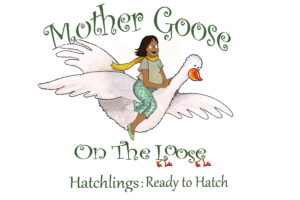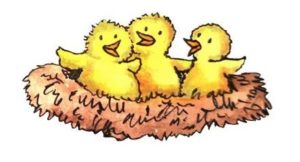Key Hatchlings Concepts
Hatchlings follows the Mother Goose on the Loose Format and Philosophy
- Builds upon a foundation of ritual, repetition, music, movement learning by doing, joy, non-judgmental atmosphere, and play
- Enthusiasm breeds enthusiasm
- Starts each session with warm-up activities to nurture comfort amongst participants before moving into more interactive activities
- Uses props to engage attention
- Teaches lullabies to slow things down
Both Hatchlings programs’ (“Ready to Hatch” – before baby is born) and (“In the Nest” – after baby arrives) are designed to:
- Empower parents as their babies’ first and most important teacher
- Plant the roots of early literacy development for expectant and new families through in-person and outreach programming so that ALL families can learn the importance of daily early reading (sharing books), singing, and bonding with their babies
- Inform families that literacy begins before birth and continues in the earliest months of life
- Help parents discover how librarians and library early literacy programs can support and engage expectant families and families with newborns through their preschool years
Hatchlings integrates the following Health and Child Development Information:
- After birth, babies can see objects 8 to 10 inches from their face (Newborns like to focus on simple, high contrast black and white images that are easy for them to see and hold their attention while allowing their minds to rest)
- Tummy time is important (i.e. it strengthens head, neck, and upper body muscles, helping babies develop the strength and coordination needed for rolling over, crawling, reaching, and playing)
- Peek-a-boo helps babies focus attention and develop coping skills
- Babies need their sleep for health and growth
- Babies hear words while they are still in the womb and can remember some of what they heard even after birth
Hatchlings highlights Early Literacy information and Practices:
- Children with positive feelings about books from infancy find it easier to learn to read
- Becoming aware of syllables and the sounds in words is essential for learning how to read
- It’s never too early to start showing your baby the meaning of words; parents learn to talk to their babies throughout the day by verbalizing their babies’ experiences
- Hearing and making animal sounds helps babies hear the smaller sounds in words
Changing the words to songs and rhymes keeps them fun and can make them more relevant
While still in the planning stages, the Hatchlings Steering Committee developed the following set of desired outcomes.
Desired Outcomes:
- Participating librarians will gain both knowledge and confidence in providing effective early literacy training for expectant parents (Ready to Hatch) and parents of young infants (In the Nest).
Target: At least 80% of librarians will report gains in knowledge and confidence on an assessment survey after training and in de-briefing sessions following workshop delivery.
- Parents participating in Hatchlings: Ready to Hatch will gain both knowledge and confidence in their ability to nurture their infant’s early literacy development.
Target: At least 75% of parents will report gains in knowledge and confidence on a retrospective pre-post assessment survey.
- Parents participating in Hatchlings: Ready to Hatch will increase their understanding of the importance of talking, singing and reading (book-sharing) with their babies daily, before and after birth, to both bonding and early literacy development.
Target: At least 25% of parents will report a routine of talking, singing and reading with their newborns on a follow-up survey.
- Parents participating in Hatchlings: In the Nest will gain both knowledge and confidence in their ability to provide appropriate activities to nurture their baby’s early literacy development.
Target: At least 85% of parents will report gains in knowledge and confidence on a retrospective pre-post assessment survey.
- Parents participating in Hatchlings: In the Nest will increase their understanding of the importance of talking, singing, reading (book-sharing), and playing with their babies daily to both bonding and early literacy development.
Target: At least 50% of parents will report a routine of talking, singing, reading (book-sharing), and playing with their babies on a follow-up survey.
- Parents participating in both Hatchlings: Ready to Hatch and In the Nest will increase their understanding of the importance of talking, singing, reading (book sharing), and playing with their babies daily to healthy social emotional and early literacy development.
Target: At least 75% of parents will report a routine of talking, singing, reading (book-sharing), and playing with their babies on a follow-up survey.
Learn about the research findings
See photos from the pilot programs by clicking here
Return to Hatchlings home page
The Mother Goose on the Loose: Hatchlings program by Betsy Diamant-Cohen is licensed under CC BY-SA 4.0


